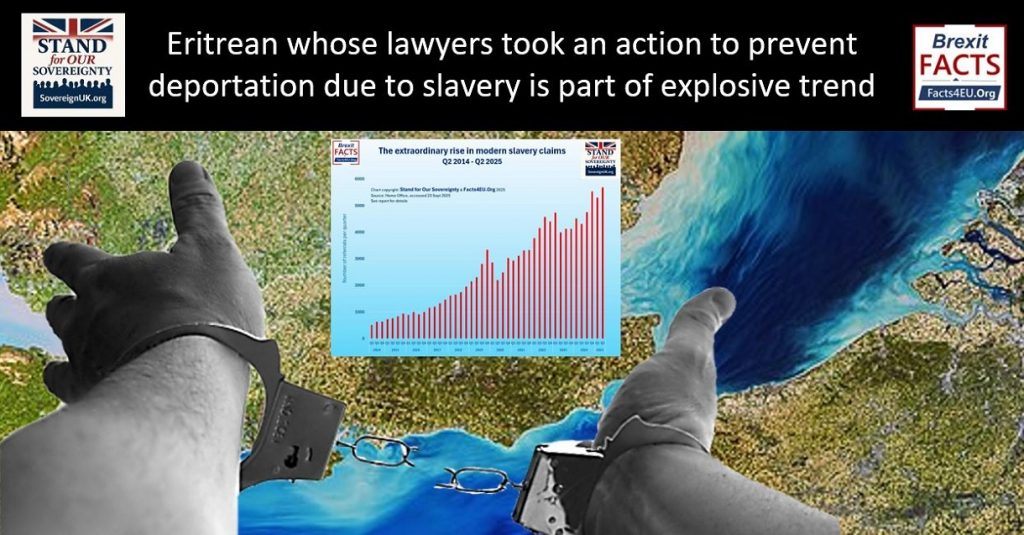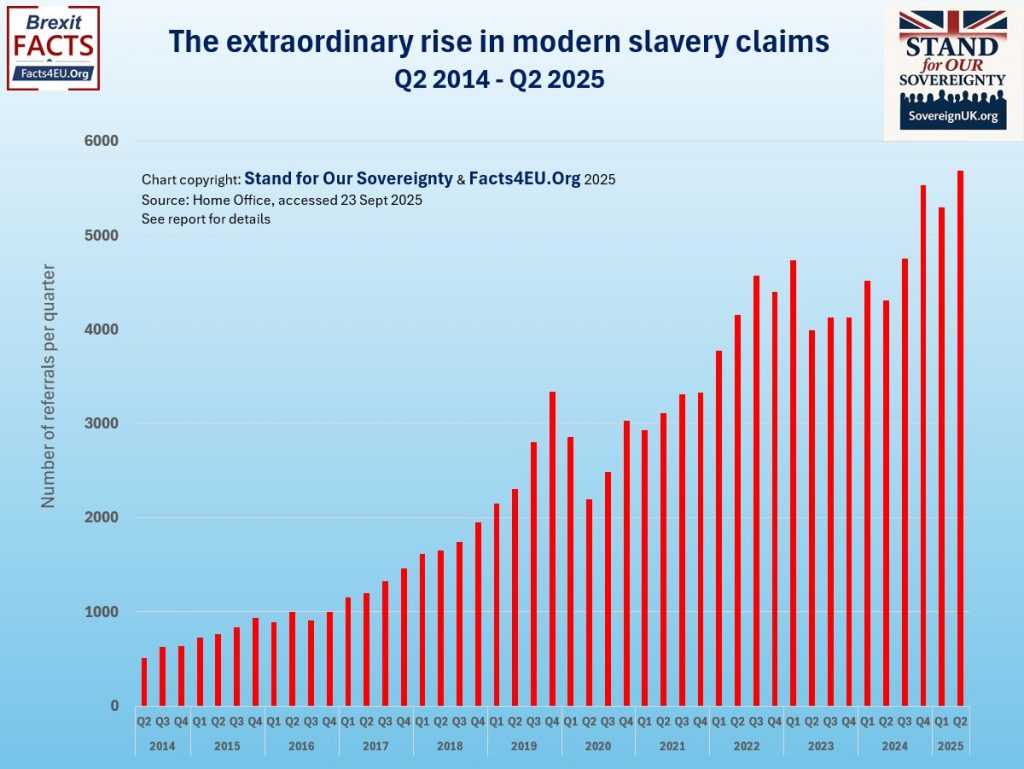Eritrean whose lawyers took an action to prevent deportation due to slavery is part of explosive trend

Home Office delays mean they gain up to two years in UK before case is decided
As readers will no doubt be aware, one of the very few illegal migrants ever to make it near to an aeroplane for deportation to France under Sir Keir Starmer’s notorious ‘one in, one out’ deal, was saved by a legal action brought by immigration lawyers. The grounds for this action were because at the last minute he claimed to be a victim of modern slavery. The Home Office subsequently lost its appeal.
This report looks at a little-known aspect of the whole immigration saga which goes by the vague-sounding name of the National Referral Mechanism, or NRM. Claims under the NRM have jumped by 32% in the last year alone, and by far more over the last 10 years. The numbers will shock most readers.
This report has been prepared by Stand for Our Sovereignty, with assistance from colleagues from Facts4EU.Org, and is published in association with GB News.
What is modern slavery and who deals with the cases?
Modern slavery is a term that includes any form of human trafficking, slavery, servitude or forced labour, as set out in the Modern Slavery Act 2015. Potential victims of modern slavery in the UK who come to the attention of what are known as ‘Authorised First Responder Organisations’ are referred to the ‘National Referral Mechanism’ which is always known by its initials of NRM. Strangely, the Authorised First Responder Organisations are never referred to by their acronym.
Authorised first responder organisations include local authorities, specified non-governmental organisations (NGOs), police forces and specified government agencies.
How the number of alleged cases has rocketed
The Home Office states “Referrals have broadly increased since 2014.” This is not how Stand for Our Sovereignty would characterise the rise, but we leave it to readers to decide for themselves after looking at our chart that follows.
Q2 2014 : 506
Q2 2025 : 5,690 (+1025%)
[Source: The UK Home Office files, starting at first reliable year.]
This represents a shocking increase of 1,000% in the last 11 years. (1,025%, to be more exact.) The Home Office does not have a definitive explanation for this, stating “It is not possible to point to a single cause or factor driving this increase.”
The extraordinary rise in modern slavery claims
2014 – 2025

The two levels of approval
In essence there are two levels of approval possible, and two levels of rejection, plus an appeals process.
The two approvals are: ‘reasonable grounds, and ‘conclusive grounds’. We shall come back to the fact that ‘conclusive grounds’ are in fact no such thing.
Before 30 January 2023, the decision maker could suspect but not prove that the individual was a victim of modern slavery, and give him a ‘reasonable grounds’ approval. This test was then amended slightly so that the decision maker had to agree there were reasonable grounds to believe, based on objective factors, that a person was a victim. Six months later it was amended again. It remained ‘objective’ but the decision maker had to “agree with the statement that there are reasonable grounds to believe that a person is a victim of modern slavery.” As far as we can tell, he had to believe supporting information might become available.
Once an alleged victim has a positive reasonable grounds decision, he is then put in the queue for a ‘conclusive grounds decision’. When this is eventually made, it indicates that, “on the balance of probabilities”, there is sufficient information to consider the individual is a victim of modern slavery. In other words, as we suggested above, the decision is effectively still guesswork, but presumably by a more senior person.
Who decides?
As with almost every aspect of the immigration processes controlled by the Home Office, the decision of who decides cases is complicated. There are, for some reason, two bodies that deal with cases. The first is called the Single Competent Authority (SCA) but its name belies its status.
This is because there is in fact a second body, called the Immigration Enforcement Competent Authority (IECA). Overall, the Home Office says that “Trained specialists in the Home Office decide who is recognised as a victim of modern slavery.”
Apparently 130 countries allow modern slavery
Below is a list of the Top 20 overseas countries where migrants claim to have been the victims of modern slavery in the last quarter alone (Q2 2025). 50% of all cases are claimed to have happened abroad and this percentage is rising. In the last quarter, 40% are alleged to have happened in the UK, and the remaining 10% both overseas and in the UK. Clearly cases happening overseas make them almost impossible to verify.
The Top 20 countries where these migrants were victims of modern slavery

Readers will note that seven out of the Top 20 are in fact member countries of the EU, with France – the country to which illegal boat migrants are supposed to be deported to – ranked at No.5.
Even more extraordinary is the total number of countries involved: 130.
The public is being asked to believe that these migrants had to escape these 130 countries, most of which will have their own policing systems acting to protect anyone who is a victim of modern slavery.
They then had to travel very long distances through many other safe countries, in order to be safe from their ordeal in the UK.
The gender balance
Overall, of the 5,690 potential victims referred in this quarter, 74% (4,216) were male and 26% (1,469) were female. This makes the proportions close to those of the illegal boat migrants. The figures we are quoting in this report refer to all migrants making these claims, not only boat migrants.
Join us here – UK sovereignty needs you! – Introductory 50% off standard Membership!
(ANNUAL Memberships, lasting 12 months from the date you join. Cancel any time – membership continues until expiry and you won’t be charged again.)
– very much welcomed – in addition to or instead of the above
(Stand for Our Sovereignty is a campaigning division of CIBUK)
The three Membership levels offer increasing levels of privileges. PLEASE NOTE: The standard Sovereign Membership is currently £12/yr (approx 3p per day) and is an introductory price at 50% off. It will soon rise to the full £24/yr so hurry! We need as many Members as possible to give us the funds to put up a professional fight, so please tell your friends and family!
Big-hitter who believes in sovereignty and wants to see their money make a real difference?
If you are a potential large donor, then please contact our Chairman here.
All monies are handled by CIBUK, the oldest-established organisation for independence in the UK, founded in 1969. We trust this will give everyone confidence that their money will be managed properly and spent effectively on Stand for Our Sovereignty’s work.
Don’t leave this to someone else. You are that ‘someone else’.
The rate of approvals
Historically the rate of positive decisions for ‘reasonable grounds’ was high, with around 9 out of 10 being accepted. In early 2023, however, the criteria was reviewed. This happened first in January of that year and then in July. Each time it resulted in a substantial decrease in the numbers being approved.
In the last quarter this difference can be seen starkly. From April to June 2025, out of the 5,895 reasonable grounds decisions were issued, 58% were positive. Of the 2,457 negative decisions, the most common reason given was an insufficient amount of information, followed by a belief that the referral did not meet the definition for modern slavery.
What is clear is that for years the Home Office was approving thousands of migrants that it should not have, all on the grounds of allegations of being trafficked as slaves, without anything approaching proof. It seems likely now that there will be another increase in escape from slavery being used as a reason to be granted leave to stay, once word gets around of the Eritrean man’s success – at least for the time being.
Finally, the time taken to process claims
For cases which received a ‘conclusive grounds’ decision from April to June 2025, the average (median) time taken from referral to ‘conclusive grounds’ decision across the competent authorities was 712 days. This is around two weeks shy of taking two years.
The Home Office says that this delay has been dropping recently and it seems clear that the system was close to being unfit for purpose until the focus of the entire country started falling on immigration.
Back to the Court of Appeal
Returning to the Eritrean who claimed modern slavery at the last minute to prevent his deportation to France, it is perfectly obvious that the judge who originally ruled and the judges at the Court of Appeal who refused the appeal by Shabana Mahmood, Home Secretary, live in a very different world to the rest of us. It stretches the bounds of credibility to breaking point that this important subject had slipped this migrant’s mind until he was about to be put on a flight.
Questions might also be asked about who suggested to him that he should do this.
This report has been prepared by Stand for Our Sovereignty, with assistance from colleagues from Facts4EU.Org, and is published in association with GB News.
